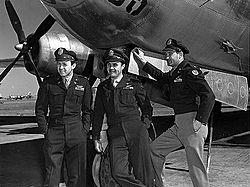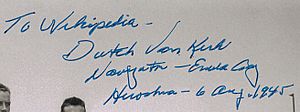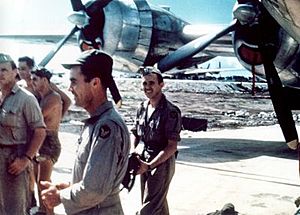Theodore Van Kirk facts for kids
Quick facts for kids
Theodore J. Van Kirk
|
|
|---|---|

Van Kirk (left) with Tibbets, and Ferebee, 6 August 1945
|
|
| Nickname(s) | "Dutch", "Ted" |
| Born | February 27, 1921 Northumberland, Pennsylvania, U.S. |
| Died | July 28, 2014 (aged 93) Stone Mountain, Georgia, U.S. |
| Allegiance | United States |
| Service/ |
United States Army |
| Years of service | 1941–1946 |
| Rank | Major |
| Unit |
|
| Battles/wars | World War II |
| Awards |
|
| Signature |  |
Theodore Jerome "Dutch" Van Kirk (1921–2014) was a skilled navigator in the United States Army Air Forces. He is most famous for being the navigator on the Enola Gay plane. This plane dropped the first atomic bomb on Hiroshima during World War II. After his crewmate Morris Jeppson passed away in 2010, Van Kirk became the last living member of the Enola Gay crew.
Contents
Early Military Career
Theodore Van Kirk was born in Northumberland, Pennsylvania. He joined the United States Army Air Forces in October 1941. By April 1942, he became a navigator. He joined the 97th Bomb Group in England. This was the first group to use the Boeing B-17 Flying Fortress planes. Van Kirk worked with pilot Paul Tibbets and bombardier Tom Ferebee. They would later fly together on the famous Hiroshima mission.
From August to October 1942, Van Kirk's crew flew 11 missions from England. Their plane, called the "Red Gremlin," was often the lead aircraft. This meant they were in charge of guiding the group and aiming for targets. In October 1942, they flew General Mark W. Clark to Gibraltar. This was for a secret meeting before Operation Torch, a big invasion in North Africa.
In November, they flew General Dwight D. Eisenhower to Gibraltar. He was going to lead the invasion forces in North Africa. Later, German forces became a threat in Bizerte, Tunisia. On November 16, 1942, Van Kirk's crew led an attack. They surprised the Germans at Bizerte-Sidi Ahmed Air Base.
The Atomic Bombing Mission
Van Kirk returned to the U.S. in June 1943. He had flown 58 missions overseas. He then worked as an instructor navigator. In late 1944, he joined Tibbets and Ferebee again. They were part of the 509th Composite Group at Wendover Field, Utah. This group flew the Boeing B-29 Superfortress plane. Tibbets was the commander, and Van Kirk was the main navigator for the group.
From November 1944 to June 1945, they trained for the first atomic bomb drop. This historic event happened on August 6, 1945. The mission to Hiroshima started at 2:45 AM from Tinian island. By 6:07 AM, they met their other B-29 planes over Iwo Jima. They were then three hours away from their target.
As they got closer, Van Kirk worked closely with bombardier Tom Ferebee. They checked the winds and confirmed their aiming point. The bomb was released from the plane at 9:15:17 AM Tinian time. Van Kirk also took part in Operation Crossroads later. These were the first atomic bomb tests at Bikini Atoll.
In October 2007, Van Kirk sold the flight log he kept during the Hiroshima mission. It was sold for US$358,500 at an auction. He said he wanted the log to be kept in a museum. The buyer's name was not shared, but they were a U.S. citizen.
Life After the War
In August 1946, Van Kirk finished his service in the Army Air Forces. He held the rank of Major. He received several awards for his bravery. These included the Silver Star, the Distinguished Flying Cross, and 15 Air Medals.
After his military service, Van Kirk went to college. He earned degrees in Chemical Engineering from Bucknell University in 1949 and 1950. For the next 35 years, he worked for DuPont. He held different jobs in research and marketing.
Dutch Van Kirk often appeared at air shows and events. He shared his experiences with the public. For example, he spoke at the MacDill Air Force Base Air Fest in 2005. He also attended the Thunder over Michigan Air Show in 2008.

On April 9, 2010, Van Kirk spoke at the University of West Georgia. He was called the "Lone Survivor of Enola Gay." On September 3, 2010, Major Van Kirk and his wife attended a model air show. It was called "Warbirds Over Atlanta 2010." He signed books and photos while a replica B-29 flew overhead.
Van Kirk also appeared at the Vectren Dayton Air Show in July 2012. He signed his book, My True Course, at the Marietta Museum of History in August 2012. He also gave a special talk there.
On September 14, 2013, Major Van Kirk visited the Frontiers of Flight Museum in Dallas, Texas. He spoke for about an hour about his time in the military. He signed copies of his book. He shared stories about his practice bombing runs and real missions. When asked the difference, he said, "In America, they're not shooting at you!"
The next day, September 15, 2013, he spoke at the Cavanaugh Flight Museum in Addison, Texas. He answered questions about his service and his role on the Enola Gay. He also signed more copies of his book.
Theodore "Dutch" Van Kirk passed away on July 28, 2014. He was survived by his four children.
Awards and Decorations
Here are some of the awards Van Kirk received:
 |
||
| USAAF Navigator Badge | |||||||||||
| Silver Star | |||||||||||
| Distinguished Flying Cross | Air Medal with two silver and two bronze oak leaf clusters |
Air Medal with bronze oak leaf cluster (second ribbon required for accoutrement spacing) |
|||||||||
| Air Force Outstanding Unit Award with "V" device |
American Defense Service Medal | American Campaign Medal | |||||||||
| Asiatic-Pacific Campaign Medal with two bronze campaign stars |
European-African-Middle Eastern Campaign Medal with two bronze campaign stars |
World War II Victory Medal | |||||||||
See Also
- White Light/Black Rain: The Destruction of Hiroshima and Nagasaki (2007)
 | Delilah Pierce |
 | Gordon Parks |
 | Augusta Savage |
 | Charles Ethan Porter |


